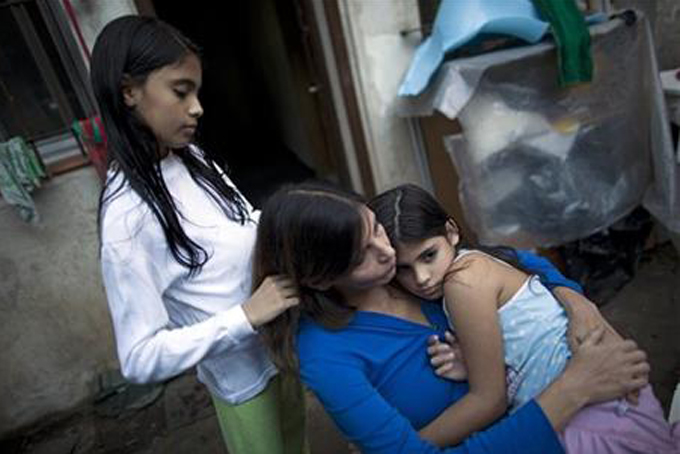
Andrea Nerone, center, sits with her daughters Malena, right, and Candela at their home during an interview in Buenos Aires, Argentina.(AP Photo/Natacha Pisarenko)
by Debora Rey
BUENOS AIRES, Argentina (AP) — Andrea Nerone lost her home and later was denied welfare to support her family after her husband abandoned her and their four children late last year.
Unemployed and no longer able to pay the rent on their previous home, Nerone crowded with her kids into a modest house owned by her mother and collected welfare for a few months. But the payments were cut off when the government determined that the children’s father was employed and thus able to support them.
The big problem: the family was no longer in contact with him and he wasn’t giving them any money.
A decree recently issued by Argentina’s female president could help keep other women like Nerone from falling into similar straits if their partners leave. After spending billions on welfare to families that keep kids vaccinated and in school, President Cristina Fernandez has made a key change: From now on, mothers will collect welfare payments instead of fathers.
The measure announced last month is a victory for the Argentine housewives union, underscoring the growing role of women in a patriarchal society while also trying to resolve the financial problems caused by profligate fathers. It is also the first major change in the country’s per-child welfare payments, a cash transfer program similar to those that have brought millions out of poverty across Latin America.
Nerone welcomed the decision to put government aid into the hands of women.
“It’s a desperate situation because the father of my kids sold even their bed,” Nerone, 46, said in her current home in the Buenos Aires suburb of Villa Adelina. She shares one room with her children: Candela, 10, Malena, 9, Sebastian, 6, and Ailen, 17, who recently had a baby of her own. “The government assumes that if the father is working then you have an income,” she said.
Fernandez said in a speech announcing the change that it is not designed to punish men, but rather to protect women.
“We have many complaints by women who are abandoned by their husbands but the guys keep on collecting” welfare payments, Fernandez said. “So we want the mother to always get the money, except in cases where courts give legal custody to the father. This is fair.”
Unemployed Argentine families get 460 pesos ($85) per child and 1,500 pesos ($278) per disabled child through monthly payments. Adults receive 80 percent of the funds directly deposited into a bank account. The remaining 20 percent of the allowance is paid to families once annually after they prove they got their children vaccinated and kept them in school.
“It’s well-known that transferring the resources to women results in a greater empowerment for them inside the household and a better use of resources, including food and clothing for their children,” said Nora Lustig, professor of Latin American economics at Tulane University in New Orleans, Louisiana.
Lustig said Argentina would do well to follow the example of countries like Mexico, which delivers social aid for families to mothers rather than fathers through its Plan Progresa.
Argentina’s state pensions agency estimates that the conditional cash transfer program Fernandez created by emergency decree in October 2009 has grown into a nearly $3.5 billion a year transfer of wealth to Argentina’s poor. It benefits 3.3 million children.
The new decree giving the aid directly to women “is the guarantee that the money will go to the child and recognizes the work of stay-at-home moms,” said Carmen Flores, secretary of the Argentine housewives union.
Giving women control over their household finances could prove critical to poor families in Argentina, where inflation is eating away at earnings. Officially, inflation remains under 10 percent, but few Argentines trust those statistics and instead accept the 25 percent estimate by private analysts.
The World Bank recognizes the key role of women in Latin America’s economic development. In a report last year, it said that their participation in the labor market rose 15 percent from 2000-2010.
“The reduction of poverty in the region might be due to the fact that more low-income women joined the workforce than those of higher income,” the Bank said in its report, “The Effect of Women’s Economic Power in Latin America and the Caribbean.”
The recent presidential decree will especially help Argentine women who are victims of domestic abuse because they will no longer be dependent on their husbands, said Flores, of the housewives union. She said it should also reduce the number of lawsuits filed against fathers for child support claims.
Under the new measure, Nerone’s welfare payments are to resume in July.
Critics argue that the cash-transfer programs have been corrupted, and some Argentine opponents say that low-income women get pregnant to benefit from welfare.
Even a proponent such as Lustig said “they need to be complemented with other initiatives to create transformative processes and avoid creating cultures of dependency.”
But such programs have helped pull millions of people from poverty in 18 Latin American nations. Brazil’s Bolsa Familia program alone has helped about a quarter of that country’s more than 190 million people.
“Conditional cash transfers are the most important social innovation of the last 15 years,” Lustig said. “They have allowed millions to live a little better, they have redistributed income and helped combat poverty where the market fails.”